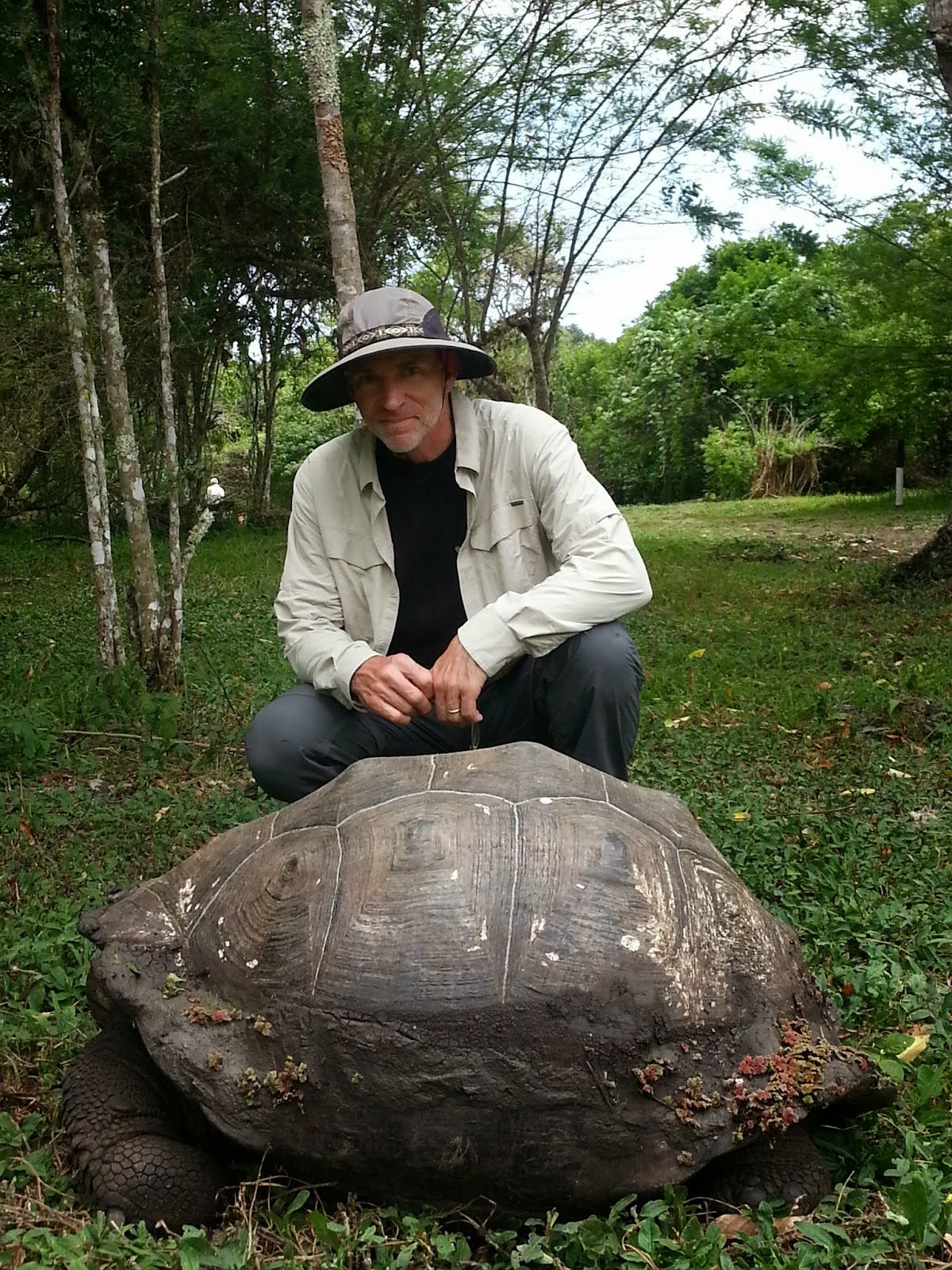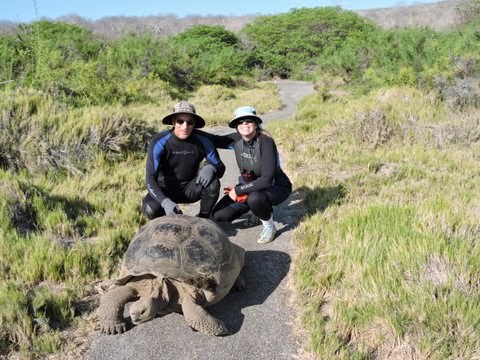Jessica explaining Galapagos flora and fauna to us. She really loves her Galapagos Islands.
We took the 8 passenger "Panga" inflatable boats from the TOG to all of our hiking and snorkelinig adventures. Our drivers were, Dario, Ivan and Xavier.
Marine iguanas were EVERYWHERE! Sometimes they were directly in our way on the path, and we had to very carefully step between their tails. They never flinched and seemed to trust us completely to not step on them. Marine iguanas eat algae in the ocean and have no desire to eat any meat.
A particularly handsome marine iguana.
Marine iguana stopping traffic. Why did the marine iguana cross the road?
Marine iguana digging her nest right along the path. Tina stood very close, but the iguana "Mom" did not stop digging. However, I thought I heard the iguana Mom mumbling something about never having seen blue hiking boots before!
Marine iguana hiding. As we were photographing him, we could hear his iguana friends telling him "Carlos, remember, if you don't move, the humans can't see you!"
Marine Iguanas eat algae from rocks in the ocean and as a result, they ingest a lot of salt water. The salt is removed by a special gland in their head and they then sneeze out this excess salt water. On to themselves and all their nearby friends. Here is an Excellent video showing marine iguanas spitting out the salt from their nostrils, then a Sally Lightfoot crab eating the dead skin off marine iguana's backs and finally a lava lizard riding shotgun on the head of a marine iguana. http://www.arkive.org/galapagos-marine-iguana/amblyrhynchus-cristatus/video-11c.html
We loved the bright colors on the "Sally Lightfoot" crabs. These crabs are black for camoflage when they are young and vulnerable to all kinds of predators, but turn to these beautiful vibrant colors when they are big enough and tough enough to withstand most of their predators.
John with his tortoise "friend" on Santa Cruz island. We found that even though the other Galapagos animals ignored us, the tortoises drew in and hissed very loudly at us when we got less than 5 feet from them.This tortoise is definitely hissing.
As soon as John moved away, the tortoise got over it, stuck out his head and went on about his business.
Baby tortoises at the hatchery where they are raised for several years until they are big enough to NOT be eaten by the feral rats, feral cats, hawks, and who knows what else.
Full size tortoise with his favorite food "Sour Apples".
Dome shell tortoise in low gear
Saddleback tortoise in high gear, look at the dust he is kicking up!
Vito auditioning for the job of being a Galapagos Tortoise! Jessica told us it was against the law to sit on a Tortoise, so this is an incriminating pic of Maggie breaking the rules.
Posing behind a tortoise that stopped on our path. As Tina and I were in this pose, the tortoise dropped a very big bombshell, fresh and wet right at my feet. Photo by Maggie D.
Jessica told us that Land Iguanas like to eat tortoise poop. This iguana has just struck GOLD!
Photo by Maggie D.
Land Iguana
Beautiful hibiscus flowers at the AltaIr lodge near Puerto Ayora on Santa Cruz island
Beautiful swimming pool at the AltaIr Lodge. Photo by Jim Marshall.
John and Tina at Darwin's Lake on Isabela Island after climbing the 150 steps.
Banana tree:
Blue Footed Boobies:
Here is a nice website with excellent pics and discussion of Blue Footed Boobys
http://www.factzoo.com/birds/blue-footed-booby-deep-diving.html
Jim M. photo of the sea turtle nests, with the "Stop" sign to keep people from walking around in them:
Jessica is showing us a Lava Cactus (that looks like our Hedge Hog cacti). Galapagos also has Prickly Pear Cactus (that has a tree trunk structure) and a Candelabra Cactus (that looks like our Organ Pipe cacti).
http://www.galapagos-islands-tourguide.com/galapagos-cactus.html
More photos to come!


























No comments:
Post a Comment